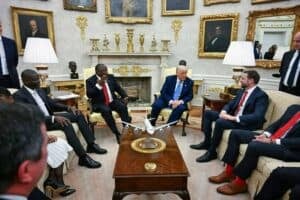Critics condemn the exclusive healthcare access enjoyed by politicians, citing the crumbling public health system and excessive spending on non-emergency medical services.

The escalating costs of SA’s presidential medical unit for top politicians have come under scrutiny, as taxpayers foot the bill for non-emergency treatments.
The medical unit, intended for emergency medical support during official travels, has expanded to include 60 personnel, 45 vehicles and provides 24/7 medical support, costing almost R500 million since 2019.
DA spokesperson on defence and military veterans Chris Hattingh questioned minister Angie Motshekga about the cost of the unit.
Motshekga questioned about medical unit for politicians
According to Motshekga, the medical costs for the politicians were nearly R80 million in 2019-20, R68 million in 2020- 21, R87 million in 2021-22, R91 million in 2022-23, and R97 million in 2023-24.
Between April and September this year, nearly R50 million had already been spent.
Hattingh criticised the culture of “blue lighting and red carpeting”, particularly prevalent in the military.
ALSO READ: Civil servants ‘need to be trained first’ — political experts
“There’s no reason why any of them, for routine medical needs, shouldn’t go to a regular doctor, specialist, or pharmacy. Like any member of a medical aid scheme, they should cover any shortfall themselves.
“Yet, we see treatments ranging from ingrown toenails to hip replacements at an exorbitant cost of about R1 million per person per month, paid by the taxpayer.”
Hattingh stressed the excessiveness of this spending, particularly when SA troops in the Democratic Republic of the Congo are under-supported medically, logistically and tactically.
Exessiveness of spending
“The SA National Defence Force, currently undermined by budget shortfalls, poorly supported international operations and unfunded internal tasks, is in a downward spiral – yet we’re willing to spend a million a month on former leaders, not for emergencies, but for full medical cover,” Hattingh said.
ActionSA chief whip Lerato Ngobeni also condemned the “unacceptable” spending. Politicians continued to receive nonemergency care from a military already strained by chronic underfunding, she said.
“We have a tiered health care system, where politicians have exclusive access to private health care paid for by taxpayers, while millions of South Africans are forced to endure the crumbling public health system,” Ngobeni said.
ALSO READ: Social media: A double-edged sword for public figures
“While security concerns may justify emergency care for the president, this unit should be for emergencies only – not for 24/7 medical support or nonemergency treatments.”
She called for a reduction in the more than R1 billion burden on taxpayers for the upkeep of a select few politicians, including cutting back on VIP protection.
Outa’s Wayne Duvenhage said while it remained unclear whether the costs mentioned are purely operational, there seems to be a significant amount of idle capacity at the medical facility.
Idle capacity at medical facility
“If these are purely operational costs, that would be around R8.3 million a month, which appears excessive. This unit can’t be that busy if it is limited to use by current and former presidents, their deputies and their spouses.”
Duvenhage called for the president to enact a law requiring all public servants – at least all MPs, managers and members of the executive in government – to use public medical facilities.
“All senior officials would then receive treatment from government-run hospitals and clinics. This could profoundly impact the government’s commitment to provide the highest levels of medical service to the public.”
NOW READ: Where in the world is Goolam?






